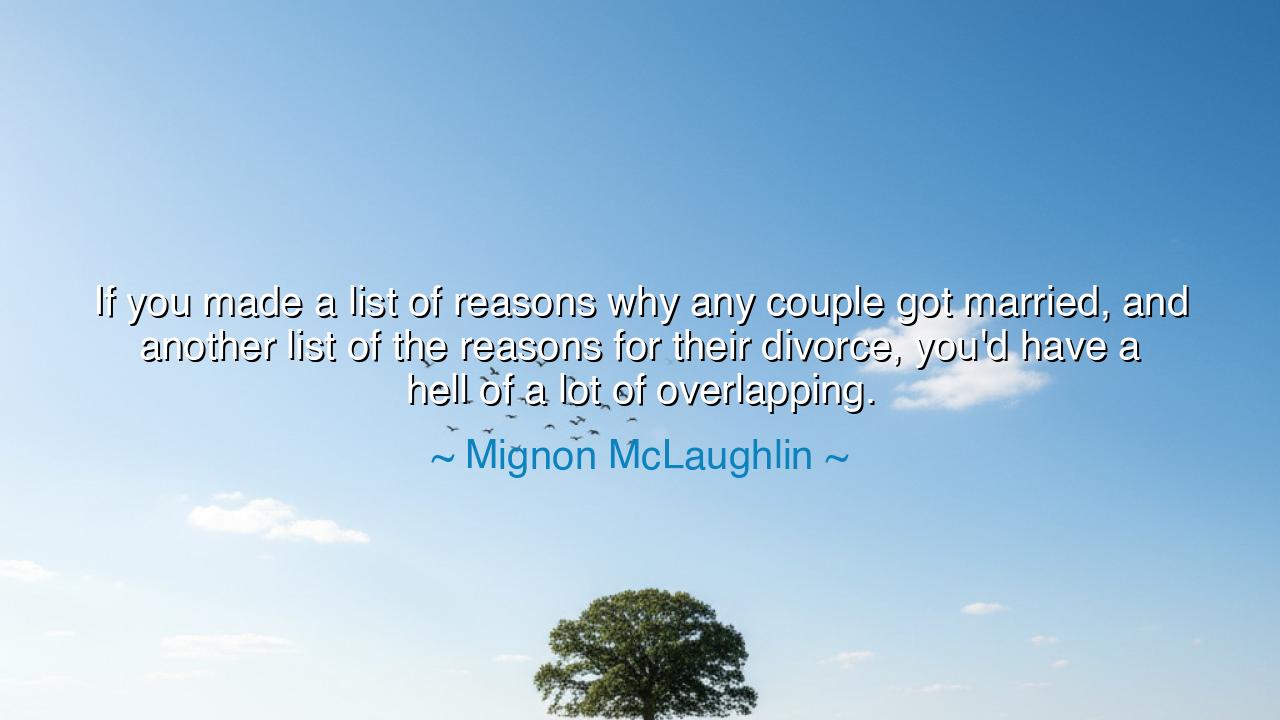
If you made a list of reasons why any couple got married, and
If you made a list of reasons why any couple got married, and another list of the reasons for their divorce, you'd have a hell of a lot of overlapping.






Hear, O seekers of wisdom, the piercing words of Mignon McLaughlin, the American essayist whose pen laid bare the tender contradictions of the human heart: “If you made a list of reasons why any couple got married, and another list of the reasons for their divorce, you'd have a hell of a lot of overlapping.” These words, cloaked in wit, are not meant to mock love, but to reveal its fragile truth. In them lives the understanding that the same fires that warm the soul may one day burn it, and that what draws two hearts together may, in time, drive them apart.
Mignon McLaughlin, who wrote in the mid-twentieth century, was known for her sharp wisdom about love, marriage, and human nature. Her insight came not from cynicism, but from clarity. She saw that the threads of affection and frustration are often spun from the same spool. The traits that charm us—the confidence, the passion, the independence, the mystery—can, when time and closeness wear them thin, become the very things that irritate or divide. Thus, she wrote with both humor and sorrow: the line between adoration and aggravation is as fine as silk.
In ancient terms, her quote speaks to the duality of human love. Love, like nature, holds both creation and destruction within it. The poet who praises spring must also acknowledge winter, for one cannot exist without the other. When two souls join, they see in each other reflections of what they most admire—and, inevitably, what they most resist. The intensity that once felt like destiny can, over the years, become a test of endurance. It is not that love fails, but that it transforms, and not all hearts are patient enough to grow with it.
Consider the story of Elizabeth Taylor and Richard Burton, two lovers whose passion was as radiant as fire and as consuming as it. They married, divorced, and married again, unable to live either with or without one another. What first drew them together—their shared brilliance, their fierce independence, their tempestuous spirits—also tore them apart. Their love was a mirror of McLaughlin’s truth: that the reasons for union and separation are often the same. What we love most in another is often what we later struggle to bear.
This is not a condemnation of love, but a call to understand its nature. To love is to stand before a mirror that reflects both joy and shadow. The wise know that affection alone is not enough; it must be accompanied by understanding, patience, and humility. When one enters marriage expecting perfection, disappointment is certain; but when one accepts that love is a lifelong act of adaptation, compassion becomes the thread that binds even fraying hearts. The challenge is not to extinguish the differences that arise, but to remember that they were once the reasons for joy.
In her humor, McLaughlin teaches the sacred art of perspective. She invites us to see the irony of human attachment—not to despair, but to laugh gently at it. For laughter is wisdom’s twin; it softens the sharp edges of truth. When we realize that the same quirks, habits, and passions that once drew us close may one day irritate us, we learn to hold love more lightly and to forgive more easily. We learn that the test of love is not in avoiding conflict, but in revisiting the reasons we loved in the first place, even when they have grown complicated.
So, my children of the heart, take this lesson into your homes: love is not static; it is a river, ever-changing. The same waters that once refreshed may later flood, but it is still the same river. Learn to build bridges rather than walls. When you find yourself weary of the traits that once charmed you, pause, and remember why they once did. See your partner not as the cause of your struggle, but as the companion of your growth. For in the acceptance of imperfection lies the secret to lasting love.
And when you hear the words of Mignon McLaughlin, remember that they are not bitter—they are wise. She speaks not against marriage, but for understanding. Her quote is a lantern for all who walk the winding path of partnership, illuminating both the humor and the holiness of love. In the end, what matters is not avoiding the overlap between joy and sorrow, but learning to live within it—to cherish it as proof that love, in all its contradictions, remains the most human of miracles.






AAdministratorAdministrator
Welcome, honored guests. Please leave a comment, we will respond soon